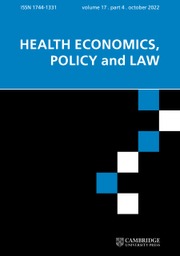Crossref Citations
This article has been cited by the following publications. This list is generated based on data provided by
Crossref.
Wood, Alex M.
and
Tarrier, Nicholas
2010.
Positive Clinical Psychology: A new vision and strategy for integrated research and practice.
Clinical Psychology Review,
Vol. 30,
Issue. 7,
p.
819.
Wood, Alex M.
Froh, Jeffrey J.
and
Geraghty, Adam W.A.
2010.
Gratitude and well-being: A review and theoretical integration.
Clinical Psychology Review,
Vol. 30,
Issue. 7,
p.
890.
Boyce, Christopher J.
and
Wood, Alex M.
2011.
Personality and the marginal utility of income: Personality interacts with increases in household income to determine life satisfaction.
Journal of Economic Behavior & Organization,
Vol. 78,
Issue. 1-2,
p.
183.
Wood, Alex M.
Boyce, Christopher J.
Moore, Simon C.
and
Brown, Gordon D.A.
2012.
An evolutionary based social rank explanation of why low income predicts mental distress: A 17 year cohort study of 30,000 people.
Journal of Affective Disorders,
Vol. 136,
Issue. 3,
p.
882.
Boyce, Christopher J.
Wood, Alex M.
and
Powdthavee, Nattavudh
2013.
Is Personality Fixed? Personality Changes as Much as “Variable” Economic Factors and More Strongly Predicts Changes to Life Satisfaction.
Social Indicators Research,
Vol. 111,
Issue. 1,
p.
287.
Guzman, Jaime
Ibrahimova, Aybaniz
Tompa, Emile
Koehoorn, Mieke
and
Alamgir, Hasanat
2013.
Nonwage Losses Associated With Occupational Injury Among Health Care Workers.
Journal of Occupational & Environmental Medicine,
Vol. 55,
Issue. 8,
p.
910.
Osafo Hounkpatin, Hilda
Wood, Alex M.
Brown, Gordon D. A.
and
Dunn, Graham
2015.
Why does Income Relate to Depressive Symptoms? Testing the Income Rank Hypothesis Longitudinally.
Social Indicators Research,
Vol. 124,
Issue. 2,
p.
637.
Sekulova, Filka
and
van den Bergh, Jeroen C.J.M.
2016.
Floods and happiness: Empirical evidence from Bulgaria.
Ecological Economics,
Vol. 126,
Issue. ,
p.
51.
Johnston, David W.
Shields, Michael A.
and
Suziedelyte, Agne
2018.
Victimisation, Well‐being and Compensation: Using Panel Data to Estimate the Costs of Violent Crime.
The Economic Journal,
Vol. 128,
Issue. 611,
p.
1545.
Kennedy, James
2020.
Subjective Wellbeing and the Discount Rate.
Journal of Happiness Studies,
Vol. 21,
Issue. 2,
p.
635.
AKAY, ALPASLAN
KARABULUT, GOKHAN
and
YILMAZ, LEVENT
2021.
LIFE SATISFACTION, PRO-ACTIVITY AND EMPLOYMENT.
The Singapore Economic Review,
p.
1.
Wang, Enjian
Hu, Hongwei
Xu, Yang
Liu, Hongting
Yang, Bai
Chang, Ruihui
and
Jiang, Wei
2021.
The Association Between the Special Subsidy for Families Practicing Family Planning and the Mental Health of Loss/Disability-of-Single-Child Parents: Evidence from China.
Administration and Policy in Mental Health and Mental Health Services Research,
Vol. 48,
Issue. 2,
p.
316.




